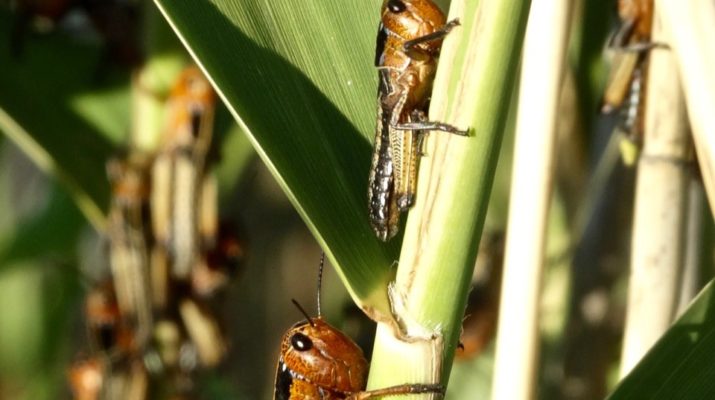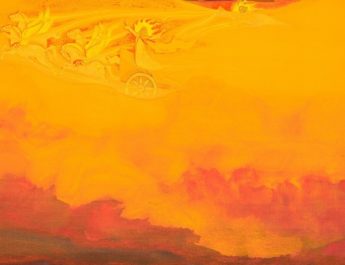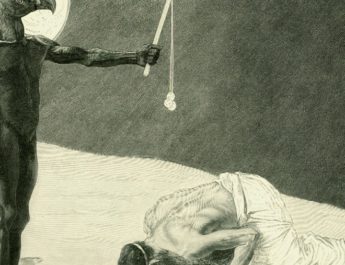Joel 2:23-32
Ordinary C48
23 O childrenA of Zion,B be glad,C
and rejoiceD in the LordE your God,F
A “children” = ben. From banah (to build or obtain children). This is son, age, child. It is son in a literal or figurative sense.
B “Zion” = Tsiyyon. Related to tsyiyyun (signpost, monument); from tsavah (to charge someone, to command, order); from the same as tsiyyah (dryness drought); from a root meaning parched as desert, dry land. Zion can refer to a mountain in Jerusalem as well as another name for Jerusalem itself or the people.
C “be glad” = gil. Properly, this is twirling around because of a strong feeling whether of rejoicing or from fear. This can be rejoice, be glad or joyful, or to cry.
D “rejoice” = samach. This is to rejoice or be glad. Properly, it is to brighten up in a literal or figurative sense.
E “Lord” = YHVH. From havah (to be, become) or hayah (to come to pass, become, be). This is the name of the God of Israel, the self-existent and eternal one, the tetragrammaton. This pronunciation has been lost to time so “Lord” is generally used in its place.
F “God” = Elohim.
for he has givenG the early rainH for your vindication;I
G “given” = natan. This is to give, put, set, offer. It is to give literally or figuratively.
H “early rain” = moreh. 3x in OT. From yarah (to throw, shoot, be stunned; to flow as water so figuratively to instruct or teach). This is early rain, teacher, what is taught, archer.
I “vindication” = tsedaqah. From the same as tsedeq (rightness, righteousness, vindication. It is everything that is just or ethical. That which is right in a natural, moral, or legal sense. It also includes just weights (i.e. true weights). Figuratively, this is justice, righteousness, equity – even prosperity). This is righteousness, justice, righteous acts, and moral virtue.
he has poured downJ for you abundant rain,K
the early and the later rain,L as before.M
J “poured down” = yarad. This is to go down, descend; going down in a literal or figurative sense. It can be going to the shore or a boundary, bringing down an enemy.
K “abundant rain” = geshem. Perhaps from gasham (to rain). This is rain, shower, or rainy. It can be used figuratively for blessing or for destruction.
L “later rain” = malqosh. 8x in OT. From the same as leqesh (later growth, spring crop); from laqash (to take everything, gathering the later crop). This is late or the spring rain. Can refer figuratively to eloquence.
M “before” = rishon. From rishah (beginning or early time); from rosh (head, captain, or chief; excellent or the forefront; first in position or in statue or in time). This is first, former, ancestor, beginning, ranked first.
24 The threshing floorsN shall be fullO of grain;P
N “threshing floors” = goren. Root may mean to smooth. It is a threshing floor, barn, or open areas more generally.
O “be full” = male. This is fill, satisfy, replenish, accomplish, fulfill, confirm, or consecrate. It is fill in a literal or figurative sense.
P “grain” = bar. 14x in OT. From barar (to select, polish, cleanse, brighten, purify). This is something that is winnowed so any kind of grain, whether in the field or harvested. It can be corn, wheat, or other grains. This can also refer to a field or the open country.
the vatsQ shall overflowR with wineS and oil.T
Q “vats” = yeqeb. 16x in OT. This is wine vat or wine press. Root may mean to excavate – so it would be the trough as excavated. Specifically, it could refer to a vat that collects wine or an upper vat where grapes are crushed.
R “overflow” = shuq. 3x in OT. This is to be plenty, to flow over in abundance.
S “wine” = tirosh. From yarash (inheriting or dispossessing; refers to occupying or colonizing – taking territory by driving out the previous inhabitants and living there instead of them; by implication, to seize or rob, to expel, ruin, or impoverish). This is new wine or sweet wine – wine that is freshly squeezed. Sometimes used for fermented wine.
T “oil” = yitshar. From tsahar (to press oil or glisten). This is fresh oil, anointed. It is oil as that which is burned to make light; used figuratively to talk about anointing.
25 I will repayU you for the yearsV
that the swarming locustW has eaten,X
U “repay” = shalam. This is to be complete or sound – to have safety mentally, physically, or extending to one’s estate. So, if these things are safe and complete, the implication is that one would be friendly; and, if being friendly, one would make amends and that friendship would be reciprocated. This is the root verb that “shalom” comes from, the Hebrew word for peace.
V “years” = shanah. From shana (to change, alter). This is a year, age, old. It can also mean yearly.
W “swarming locust” = arbeh. From rabah (increasing in any aspect whether quantity, authority, size, quality, greatness, etc.). This is a locust from its abundance – a swarming locust or grasshopper.
X “eaten” = akal. This is to eat, devour, burn up, or otherwise consume. It can be eating in a literal or figurative sense.
the hopper,Y the destroyer,Z and the cutter,AA
my greatBB armyCC that I sentDD against you.
Y “hopper” = yeleq. 9x in OT. Root may mean to lick up. So, this is one that devours, a young locust or caterpillar.
Z “destroyer” = chasil. 6x in OT. From chasal (to finish or consume). This is a locust as having a ravenous appetite – one that strips plants, a grasshopper or caterpillar.
AA “cutter” = gazam. 3x in OT. May come from a word that means to devour. This is a locust or caterpillar.
BB “great” = gadol. From gadal (to grow up, become great, become wealthy – to advance. The root meaning may be to twist in the sense of the process of growing). This is great, high, bigger, noble, old, marvelous. It can also refer to someone who is powerful or distinguished.
CC “army” = chel. From chul (whirling around so dancing as in a circle or writhing in pain; used particularly for the pain of childbirth or from writhing due to fear; can also be falling in pain or waiting) OR from chayil (strength, wealth, ability, activity; a soldier or a company of soldiers; goods; a force of people, means, or goods; valor, virtue, or strength); from chul (to be firm, strong, prosperous; to endure). This is an army, entrenchment, fortress, wall, or host.
DD “sent” = shalach. This is to send out, away, send for, forsake. It can also mean to divorce or set a slave free.
26 You shall eat in plentyEE and be satisfiedFF
and praiseGG the nameHH of the Lord your God,
EE “eat in plenty” = akal + akal. Same as “eaten” in v25. See note X above. The word is repeated twice – the second time as an Infinitive Absolute. The Infinitive Absolute serves to emphasize the sentiment of the word. It is rather like Foghorn Leghorn’s speech pattern, “I said, I said.”
FF “be satisfied” = saba. To be satisfied or full in a literal or figurative sense. Also, to have plenty of.
GG “praise” = halal. This is to be clear – it originally referred to a sound, then a color. It was to shine and then make a show or boast then to rave. In a causative sense it came to mean celebrate, give glory, sing praise, or be worth of praise. Because of the celebratory nature of the word, it could also mean to give in marriage. This is where Hallelujah comes from.
HH “name” = shem. May be from sum (to put, place, set). This is name, fame, renown. A name was thought to indicate something essential about a person – something about their individuality. So, this word can also mean honor, authority, or character.
who has dealtII wondrouslyJJ with you.
And my peopleKK shall never againLL be put to shame.MM
II “dealt” = asah. This is to make, do, act, appoint, become in many senses.
JJ “wondrously” = pala. From pele (wonder, miracle, wonderful, marvelous thing). This is to be extraordinary, to arise, to be great or accomplish.
KK “people” = am. From amam (to darken, hide, associate; creating shadows by huddling together). This is people or nation. It can be used specifically for a tribe, collectively of troops or armies, or figuratively to refer to a flock of animals.
LL “again” = olam. This is a long scope of time whether in the past (antiquity, ancient time) or in the future (eternal, everlasting).
MM “put to shame” = bosh. Properly, this means to be pale, which implies shame, disappointment, or confusion.
27 You shall knowNN that I am in the midstOO of IsraelPP
and that I, the Lord, am your God and there is no other.
And my people shall never again be put to shame.
NN “know” = yada. This is to know, acknowledge, advise, answer, be aware, be acquainted with. Properly, this is to figure something out by seeing. It includes ideas of observation, recognition, and care about something. It can be used causatively for instruction, designation, and punishment.
OO “midst” = qereb. Perhaps from qarab (to come near or approach). This is among, in the midst, before, the center It is the inward part, whether literal or figurative. It can also be used for the heart, the site of thoughts and feelings. This word is also used as a technical term for the entrails of the animals who are sacrificed.
PP “Israel” = Yisrael. Related to “God” in v23. From sarah (to persist, exert oneself, contend, persevere, wrestle, prevail) + el (see note F above). This is Israel, meaning God strives or one who strives with God; new name for Jacob and for his offspring. This refers to the people and to the land.
28 ThenQQ afterwardRR
I will pour outSS my spiritTT on allUU flesh;VV
QQ {untranslated} = hayah. Related to “Lord” in v23. See note E above.
RR “afterward” = achar. From achar (to remain behind, linger, continue, be behind, or delay; can also imply procrastination). This is after or the last part, following.
SS “pour out” = shaphak. This is to pour out, gust, or slip. It can be to pour as blood, a drink offering, or molten metal. It can also mean to create a mound. Figuratively, it can refer to killing, or spending money.
TT “spirit” = ruach. This is breath, wind, air, cool, spirit. This is wind, which resembles the breath and so this can be used figuratively for life itself or being frail/mortal/impermanent. It can refer to the air of the sky or the spirit.
UU “all” = kol. From kalal (to complete). This is all or every.
VV “flesh” = basar. From basar (being a messenger, publish, carry preach; properly, this is being fresh, rosy or cheerful as one bearing news). This is flesh, the body, fat, skin, self, nakedness, humankind, or kin. It can also refer to private parts.
your sonsWW and your daughtersXX shall prophesy,YY
WW “sons” = ben. Same as “children” in v23. See note A above.
XX “daughters” = bat. Related to “children” in v23. From ben (see note A above). This is daughter in a literal or figurative sense.
YY “prophesy” = naba. From nabi (prophet, prophecy, speaker; someone inspired). This is to prophesy. Older usages referred to raving, religious ecstasy that sometimes went along with music. In later usage, it was religious teachings that sometimes held prediction. Prophesying is speaking the truth of what is and where it will lead.
your old menZZ shall dreamAAA dreams,BBB
and your young menCCC shall seeDDD visions.EEE
ZZ “old men” = zaqen. From the same as zaqan (beard or chin – the beard represents old age). This is old, aged, or elder.
AAA “dream” = chalam. Properly, to bind solidly and so to be plump. This is to be healthy or strong, to recover; figuratively, to dream.
BBB “dreams” = chalom. Related to “dream” in v28. From chalam (see note AAA above). This is a dream or dreamer.
CCC “young men” = bachur. From bachar (to choose, appoint, try, excellent). This is choice, chosen, selected. It is a youth or young man.
DDD “see” = raah. This is to see in a literal or figurative sense so stare, advise, think, view.
EEE “visions” = chizzayon. 9x in OT. From chazah (to gaze at – to see or behold; perceiving as a mental process or looking at something with pleasure; seeing a vision). This is a vision or revelation that comes in a dream.
29 Even on the maleFFF and female slaves,GGG
in those daysHHH I will pour out my spirit.
FFF “male” = ebed. From abad (to work, serve, compel; any kind of work; used causatively, can mean to enslave or keep in bondage). This is a servant, slave, or bondservant.
GGG “female slaves” = shiphchah. Root may mean to spread out – it would be the same root used in mishpachah, which means family or clan. This is maidservant, female slave, or female bondslave.
HHH “days” = yom. Root may mean being hot. This is the day in a literal or figurative sense. It can also mean birth, age, daylight, continually or other references to time.
30 I will showIII portentsJJJ in the heavensKKK and on the earth,LLL
III “show” = natan. Same as “given” in v23. See note G above.
JJJ “portents” = mopheth. Perhaps from yaphah (to be beautiful, decorate; root means being bright, which implies being beautiful). This is a wonder, miracle, symbol, sign, or omen.
KKK “heavens” = shamayim. Root may mean being lofty. This is sky, the air, or heaven. It is in a dual noun form so this might refer to the part of the sky where the clouds move on the one hand and the part beyond that where the sun, moon, and stars are on the other hand.
LLL “earth” = erets. Root may mean to be firm. This is earth, ground, field land, or country.
bloodMMM and fireNNN and columnsOOO of smoke.PPP
MMM “blood” = dam. Perhaps from damam (to cease, be or become mute, silent, still, cut off, hold peace, be astonished, die). This is blood, bloodshed, bloodguilt, lifeblood, and death. It is used for people and animals. More often blood from a wound or the blood of the innocent. Used figuratively for violence or for wine. Closely tied to life and death.
NNN “fire” = esh. This is fire, burning, flaming, hot. It is fire in a literal or figurative sense.
OOO “columns” = timarah. 2x in OT. From the same as tomer (palm tree, trunk); from the same as tamar (palm tree; root may mean being erect). This is a column or a column that resembles a palm. It could mean a cloud figuratively
PPP “smoke” = ashan. From ashan (to smoke or burn in a literal or figurative sense; to be angry). This is smoke, vapor, dust, or anger.
31 The sunQQQ shall be turnedRRR to darknessSSS and the moonTTT to blood,
beforeUUU the great and terribleVVV day of the Lord comes.WWW
QQQ “sun” = shemesh. This is sun or toward the east. Its root may mean being brilliant. Figuratively, this could be a ray or an arch.
RRR “turned” = haphak. This is to turn, overturn, change, return, turn over, pervert.
SSS “darkness” = choshek. From chashak (to be or become dark). This is literal darkness is contrast to light. Figuratively, it can be obscurity, sorrow, misery, blindness, wickedness, destruction, death. It can also be hiding places. Additionally, it can mean judgment, mourning, ignorance, evil, or sin.
TTT “moon” = yareach. Perhaps from the same as yerach (month). This is moon.
UUU “before” = paneh. From panah (to turn, face, appear). This is face in a literal or figurative sense. It could be face, presence, anger, respect. It can also be used of God to indicate divine favor or presence.
VVV “terrible” = yare. This is to fear, be afraid, dreadful. It can also refer to fearful reverence – to fear in a moral sense is to say to revere, respect.
WWW “comes” = bo. This is to enter, come in, advance, fulfill, bring offerings, enter to worship, attack. It can also have a sexual connotation.
32 ThenXXX everyoneYYY who callsZZZ on the name of the Lord shall be saved,AAAA
XXX {untranslated} = hayah. Same as {untranslated} in v28. See note QQ above.
YYY “everyone” = kol. Same as “all” in v28. See note UU above.
ZZZ “calls” = qara. This is to call or call out – to call someone by name. Also used more broadly for calling forth.
AAAA “saved” = malat. This is to be smooth, which implies to escape as slipping away from. It can also be release, rescue, deliver, or preserve. It can be used specifically to meaning giving birth or making sparks.
for in MountBBBB Zion and in JerusalemCCCC there shall beDDDD those who escape,EEEE as the Lord has said, and among the survivorsFFFF shall be those whom the Lord calls.
BBBB “Mount” = har. From harar (hill or mountain). This is mountain, hill, hilly region.
CCCC “Jerusalem” = Yerushalaim. Related to “early rain” in v23 & “repay” in v25. From yarah (see note H above) + shalam (see note U above). This is Jerusalem, dwelling of peace.
DDDD “be” = hayah. Same as {untranslated} in v28. See note QQ above.
EEEE “escape” = peletah. From paliyt (fugitive, refugee, or one who escaped); from palat (to escape, slip out, deliver, calve). This is deliverance or escape. It is the remnant that got away.
FFFF “survivors” = sarid. From sarad (to escape or remain; properly, this refers to a puncture, so figuratively it is remaining or escaping by slipping out). This is survivor, remnant, or alive.
Image credit: “Third and fourth instar hopper (L3/4) of Locusta migratoria migratoria photographed near Zhideli, Lake Balkhash, Almaty Region, Kazakhstan” by ChriKo, 2017.




